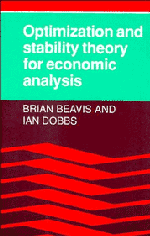Book contents
- Frontmatter
- Contents
- Preface
- 1 CONVEXITY
- 2 STATIC OPTIMIZATION
- 3 EQUILIBRIUM MATHEMATICS
- 4 COMPARATIVE STATICS AND DUALITY
- 5 DYNAMICS AND STABILITY
- 6 INTRODUCTION TO DYNAMIC OPTIMIZATION AND THE CALCULUS OF VARIATIONS
- 7 OPTIMAL CONTROL THEORY
- APPENDICES – MATHEMATICAL REVIEW
- Glossary
- Bibliography
- Author Index
- Subject Index
4 - COMPARATIVE STATICS AND DUALITY
Published online by Cambridge University Press: 05 July 2011
- Frontmatter
- Contents
- Preface
- 1 CONVEXITY
- 2 STATIC OPTIMIZATION
- 3 EQUILIBRIUM MATHEMATICS
- 4 COMPARATIVE STATICS AND DUALITY
- 5 DYNAMICS AND STABILITY
- 6 INTRODUCTION TO DYNAMIC OPTIMIZATION AND THE CALCULUS OF VARIATIONS
- 7 OPTIMAL CONTROL THEORY
- APPENDICES – MATHEMATICAL REVIEW
- Glossary
- Bibliography
- Author Index
- Subject Index
Summary
INTRODUCTION
In any static optimization problem, the objective function and the constraint functions will contain certain parameters and the optimal solution will depend on the values taken by these parameters. Thus, if any particular parameter value is altered, then we should expect the optimal choice of control variables and the maximum value of the objective function to change. The determination of the effects of parameter variations on the optimal choice of control variables and the maximum value of the objective function is referred to in the economics literature as comparative statics analysis. Section 4.2 is devoted to comparative statics analysis.
Closely related to comparative statics analysis is the theory of duality. At the heart of duality theory in economics is the notion of ‘equivalent representations’. Following Epstein (1981) we may say that:
the theory of duality describes alternative equivalent representations of consumers' preferences (direct or indirect utility function, expenditure function), or of a competitive producer's technology (production, profit or cost function).
Thus, in economics, duality refers to the existence of ‘dual functions’ which, under appropriate regularity conditions, embody the same information on preferences or technology as the more familiar ‘primal functions’ such as the utility or production function. Dual functions describe the results of optimizing responses to input and output prices and constraints rather than global responses to input and output quantities as in the corresponding primal functions.
- Type
- Chapter
- Information
- Optimisation and Stability Theory for Economic Analysis , pp. 98 - 133Publisher: Cambridge University PressPrint publication year: 1990



